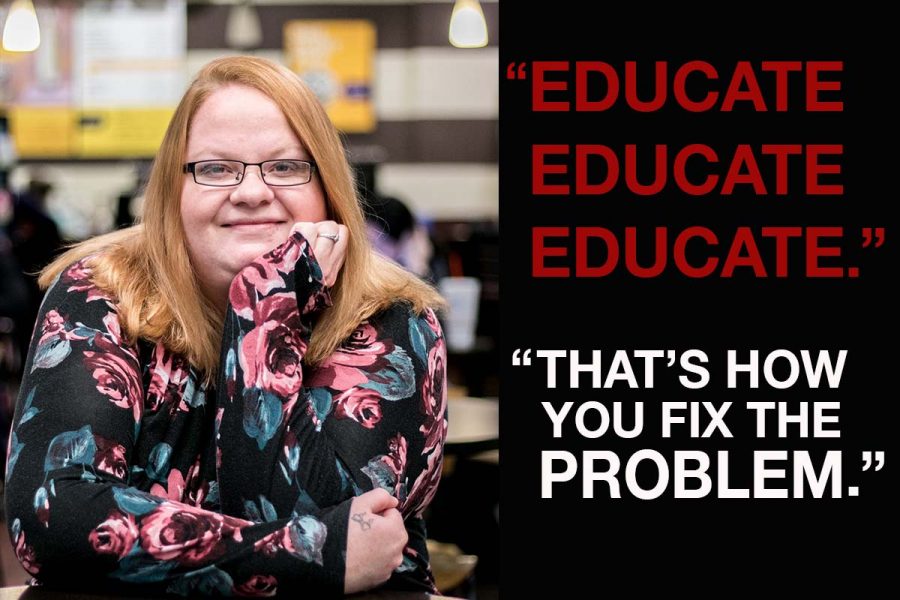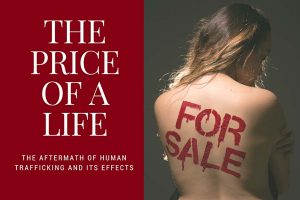Mother overcomes low self worth inflicted by human trafficking and sexual abuse
Photo by Holland Rainwater
Contact: lillyanna1122@gmail.com
March 7, 2018
Silence, when left uninterrupted, is a dangerous thing. It allows for an abandoned trailer in the middle of the woods to become a prison for a little girl. She is left untouched, except by the men who stumble in with promise of exchange.
A promise made without consent by the mother, for her daughter. A promise that would scar her mind forever.
This was the childhood reality for Mandy Mills, now a mother of four. She was a victim of human trafficking and is one of the few who have survived it to tell the story.
“My mom had a coke addiction. When you’re on that stuff, it talks louder than the person. When I was 4, my mother was put in jail for selling me and my sisters for drugs. I don’t remember the interaction with men, but it was all documented,” Mills said. “I was put in foster care, but when I was 9, I went to go live with my father. We didn’t know until years later, but my father was involved in [trafficking as well]. For a year, I was molested by my dad. I had never learned what a normal father-daughter relationship was. I thought what he was doing to me was normal.”
Mills had never known what a real family looked like. The only family she had ever known had used her body for their own benefit, for drug money and personal pleasure.
“On my birthday, I would always wonder if [my mom] thought of me. I had no foundation, no history. I had no family to take me to prom. I was afraid of my dad. He threatened to kill me if I said anything,” Mills said. “For the longest time, I thought what had happened to me was pre-karma. I felt like I was being punished.”
Mills was later adopted by her Department of Homeland Security worker, and while the physical abuse may have been over, the emotional turmoil was not.
“It’s hard for me to this day to build relationships. Everyone who was supposed to love me in my family had hurt me. It’s hard to open doors for people. It’s always in the back of my mind,” Mills said. “I felt dirty because I would never be able to offer my husband virginity, and as a Christian, that’s important. It was taken from me. I felt like I had been cheated; they took innocence away from me.”
Mills soon learned, however, that the world stops for no one. She had the option to continue living behind closed doors in fear, but she chose to attempt living a life of normalcy. However, her past experiences of being trafficked and sexually abused inhibited her from doing so freely.
“I was taught to be warned that history repeats itself, and that is the worst thing you can say to someone. I was afraid that someday I’d be like my parents,” Mills said. “That put a barrier between me and my first son. I was afraid for him to touch me, to hug me and children need that nurturing.”
Mills struggled with trying to find peace with herself and urges people to understand that human trafficking is more than the stereotype people imagine.
“People think that it’s just some warehouse full of women, but sex trafficking is trading sex for something whether it’s for drugs, for money, for power, ” Mills said. “It’s not always just a warehouse full of women. It could be your neighbor doing it for a bump of drugs. People don’t realize that that is how those warehouses were built — one person agreeing with another person to trade a human being.”
This mentality to use another person to fulfill one’s own desires creates trust issues and corrupts relationships.
“It’s not always just a creepy guy in the corner. It was my father and my mother. My dad was seen as the guy that everyone loved. He was great on the outside, but on the inside, he was the monster I had to face,” Mills said. “That’s what people misunderstand. They think, ‘Oh, that’ll never happen, to my kid.’”
However, it is happening and will continue to happen if there is no one who cares enough to stand up. It’s not just in foreign countries. It’s right here, in America.
“You never know if someone is going through it. They’re afraid of what tomorrow will bring. It’s a comfort zone. They know what to expect. They know what they’re coming home to,” Mills said. “If they say something, where [are they] going to go? Who is going to take care of [them]? Who is going to love [them]?”
It is important, above all other things, to remember that the millions of victims currently being trafficked are people. People who had lives. People who are scared to speak out. Mills survived and is turning her dark situation into light for others to break the cycle. To escape. Only through knowledge and understanding can this worldwide problem end.
“Educate. Educate. Educate. That’s how you fix the problem. If we get the word out, that’s how we fix this,” Mills said. “If it is broadcasted, it’s going to get smaller. You never know who might be there who needs someone to tell them they don’t have to live that life, to stand up for themselves. People don’t want to admit that it happened to them. They feel weak. Instead of letting it break them, let it build them.”















